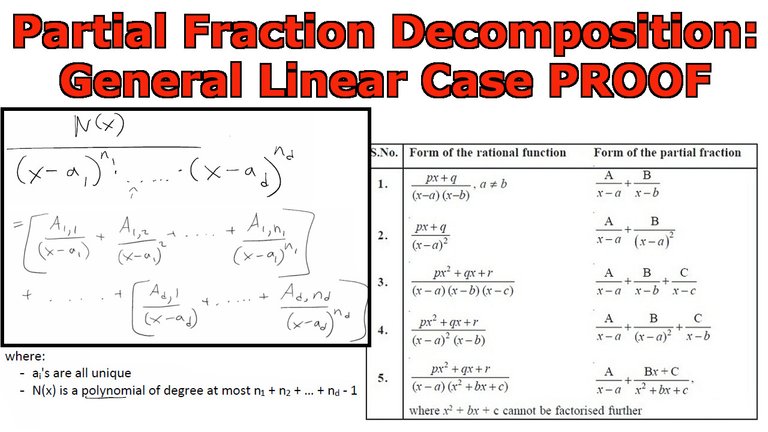Partial Fraction Decomposition: Proof of General Case with Linear Factors
In this video I go over an extensive proof of decomposing rational functions for the general case with linear factors. Although the video is very long and detailed, it follows the same style as in my earlier proof on the simplest case in which a simple theorem was first proved in which it was repeatedly applied to the overall partial fraction decomposition proof. This is a very extensive and long video but it is worthwhile following along to get an idea of just how much detail is required in proving many of the math theorems out there.
Watch Video On:
- DTube: https://d.tube/#!/v/mes/wksgqqgdh0v
- BitChute: https://www.bitchute.com/video/ih4xsG3PCvE5/
- YouTube: https://youtu.be/crTTU9SpTNI
Download Video Notes: http://1drv.ms/1FsXyHW
View Video Notes Below!
Download These Notes: Link is in Video Description.
View These Notes as an Article: https://steemit.com/@mes
Subscribe via Email: http://mes.fm/subscribe
Donate! :) https://mes.fm/donateReuse of My Videos:
- Feel free to make use of / re-upload / monetize my videos as long as you provide a link to the original video.
Fight Back Against Censorship:
- Bookmark sites/channels/accounts and check periodically
- Remember to always archive website pages in case they get deleted/changed.
Join my private Discord Chat Room: https://mes.fm/chatroom
Check out my Reddit and Voat Math Forums:
Buy "Where Did The Towers Go?" by Dr. Judy Wood: https://mes.fm/judywoodbook
Follow My #FreeEnergy Video Series: https://mes.fm/freeenergy-playlist
Watch my #AntiGravity Video Series: https://steemit.com/antigravity/@mes/series
- See Part 6 for my Self Appointed PhD and #MESDuality Breakthrough Concept!
Follow My #MESExperiments Video Series: https://steemit.com/mesexperiments/@mes/list
NOTE #1: If you don't have time to watch this whole video:
- Skip to the end for Summary and Conclusions (If Available)
- Play this video at a faster speed.
-- TOP SECRET LIFE HACK: Your brain gets used to faster speed. (#Try2xSpeed)
-- Try 4X+ Speed by Browser Extensions or Modifying Source Code.
-- Browser Extension Recommendation: https://mes.fm/videospeed-extension
-- See my tutorial to learn more: https://steemit.com/video/@mes/play-videos-at-faster-or-slower-speeds-on-any-website- Download and Read Notes.
- Read notes on Steemit #GetOnSteem
- Watch the video in parts.
NOTE #2: If video volume is too low at any part of the video:
- Download this Browser Extension Recommendation: https://mes.fm/volume-extension
Partial Fraction Decomposition: General Case for Linear Factors Proof

In my last video I went over the proof for decomposing rational functions for the simplest case of having proper fractions with linear and non-repeating factors such as the following examples:

What if the factors repeat? Such as:

The general case with linear factors:

where:
- ai's are all unique
- N(x) is a polynomial of degree at most n1 + n2 + … + nd - 1
- i.e. forms a proper fraction where degree of numerator is less than degree of denominator

To prove this we will first prove a similar form of this theorem:
Lemma 2:
Let N(x) and D(x) be polynomials of degree n and d respectively, with n < d + m. Suppose that a is NOT a zero of D(x), i.e. D(a) ≠ 0. Then there is a polynomial P(x) of degree p < d and numbers A1, …. , Am such that:

Proof of Lemma 2:
To prove Lemma 2 we need to be able to find the polynomial P(x) and numbers A1, …. , Am.
We first multiply both sides by D(x)(x - a)m :



Thus we have shown that there are numbers A1, … , Am and polynomial P(x) with degree of p < d (i.e. at most d - 1) such that:

Now back to the previous theorem:

We can apply Lemma 2 but with:


